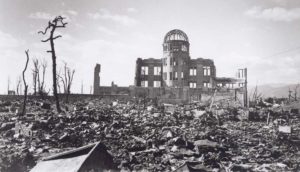 President Obama’s visit to Hiroshima this week is focusing attention on the atomic bombings. Truman’s decision to drop the bombs on Japan remains controversial. A CBS poll shows Americans evenly divided on the issue. What do I think about it?
President Obama’s visit to Hiroshima this week is focusing attention on the atomic bombings. Truman’s decision to drop the bombs on Japan remains controversial. A CBS poll shows Americans evenly divided on the issue. What do I think about it?
First of all, an interesting historical aside: If you count backwards nine months from my birth date, you get a date within the six days between Nagasaki and Japan’s surrender. I’m not sure exactly what this means, but it may mean my parents went on a drinking binge after the second bomb. I can’t ask them, because they’re gone now.
Liberals are to taught believe the A-bombings were unjustified and immoral. Many WW2 vets say “those bombs saved our lives.” What we know tends to confirm their argument; the U.S. suffered heavy casualties invading Okinawa, and invading the home islands would have been much worse; the Japanese military leaders were unswayed by the first bomb, and finally gave up only because the emperor intervened after the second bomb and said, “Look, guys, we’ve gotta surrender before they blow us to Kingdom Come.”
Yeah, a lot of civilians were killed, but Japanese cities contained military targets and were already being heavily bombed, and the Japanese authorities had plenty of time and opportunity before the A-bombings to move the women and children out of the cities and had done so.
For the guy who authorized the A-bombings, Harry Truman, it was a simple black-and-white decision that didn’t require a minute’s thought: “How can I face the families of the American soldiers who will be killed if we have this weapon and I don’t use it to end the war?” The fact it did bring about Japan’s surrender and the war’s end tends to vindicate him.
Proponents also point out that while the A-bombs took many Japanese lives, far more would have been lost if the war had dragged on. In other words, they argue the A-bombs saved Japanese as well as American lives, and that’s likely true.
Of course, there are counter-arguments. Japan depends on maritime imports and nearly all of its shipping was gone. Its naval and air forces had been decimated, its land armies were being carved up, and the home islands were nearly defenseless. Our planes could bomb and strafe at will, and there was little to stop the U.S. Navy from sailing into Tokyo Bay. Thus, when the bombs were dropped, Japan’s defeat was already assured, and the bombs weren’t necessary to win the war. But this doesn’t refute the argument that, without the bombs, Japan would have held out longer and many more lives would have expended bringing about its surrender.
As far as morality is concerned, the Japanese were the war’s aggressors, and waged the war with unparalleled savagery and brutality, so there’s a strong sense that as a nation they had it coming. On the other hand, some historians argue the real purpose of the atomic bombings in Japan was to (a) end the war before Stalin could get in on the spoils, and (b) longer range, intimidate Stalin to aid in the task of keeping Soviet ambitions contained in the postwar world.
Looking ahead, since Hiroshima and Nagasaki, there have been no more world wars and no further use of nuclear weapons, although we’ve had some close calls. And that’s where the real issue lies: As long as nations have these weapons, humanity is pushing its luck. The next close shave might take off our heads. Or what if one of these weapons (there are thousands of them, not particularly well-guarded) falls into terrorist hands? (Text continues below video.)
For the immediate present, nuclear weaponry may serve the useful purpose of scaring voters away from Donald Trump, if Democrats resurrect the “Daisy ad” (as I suspect they will do). That’s not a good enough reason to keep them around, but the paradox is that nobody can risk getting rid of them unless everyone else does, too. And even if we do, the technology is known, and it’s fairly easy to bring them back — the genie is out of the bottle forever.
Persuading the world to chuck its nuclear weapons probably is a pipe dream. Right and wrong, and morality, and even playing the odds, have nothing to do with it. The cold logic of the situation is that it’s human nature to fight, humans have always fought, many people believe there will always be wars, and few people will give up their best weapons. So our best hope probably is that because other people have them, too, everyone will be afraid to use them and they’ll stay in the barn forever.
I don’t think the odds favor that, though. It takes only one mishap or rogue leader to push the button. I believe that’s just a matter of time.
(This article is from a Horsesass.org comment, with minor editorial revisions.)